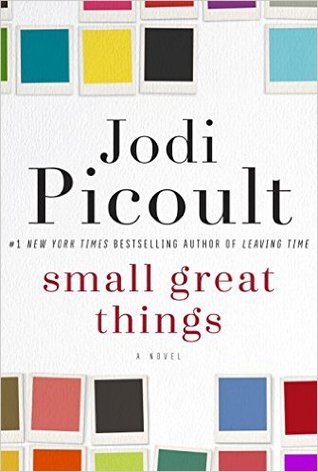 I love Jodi Picoult and I have read everything she has written. Like her other books, Small Great Things has really stayed with me. Right now in the United States, there is a lot of negativity happening during this election year, so this book is very relevant and has opened my eyes even further.
I love Jodi Picoult and I have read everything she has written. Like her other books, Small Great Things has really stayed with me. Right now in the United States, there is a lot of negativity happening during this election year, so this book is very relevant and has opened my eyes even further.
I always try to see the good in people first, and I believe everyone has the right to be treated with respect and kindness. Of course, we know that doesn’t happen. There are too many people who are treated horribly wrong because of their religion, language they speak and the color of their skin.
In Small Great Things, Jodi explores areas of race discrimination, race prejudice, race snobbery, anti-Semitism and injustice. Jodi talked about wanting to cover this topic twenty years ago but could never seem to get it right. I think she has done a great job as a white female to show the different sides of racism and how it affects different people.
In this book, Jodie tells the story from three different points of view. There is the main character Ruth, the only African-American nurse in the Labor and Delivery Department of a major Connecticut hospital. There is Turk, a white supremacist whose wife just gave birth in that L & D Department and then there is Kennedy, the white female who is a public defender and Ruth’s lawyer. We are exposed to these three people, their families, their upbringing and their beliefs.
Small Great Things reminds us that there is active racism like white supremacists and others who are hateful to people of color. Then there is passive racism where you don’t say anything when someone makes a racist comment or tells a joke. Or you stand by while someone is being treated wrong for the color of their skin or their religious beliefs.
Jodi makes me rethink how I live my life. She makes me realize that I haven’t always spoken up when someone has done or said something racist. Yes, that joke or comment made me uncomfortable and cringe, but I didn’t speak up. No more. I know I can’t stay quiet anymore. With the negativity going on in this country and after reading this book, I can no longer sit back and be quiet. It doesn’t matter how uncomfortable it makes me to hear or see the injustice, I need to step up and speak up.
I hope this book is read by many and that it makes someone else rethink the way they live their lives. This book is a must read. I received an advanced copy from Penguin Random House’s First to Read program.
Book Description:
Ruth, an African-American nurse, has worked at a CT hospital for nearly twenty years as a labor and delivery nurse. So when a young couple, Turk and Brittany, come into the hospital to have their baby, it is business as usual — until Turk calls in Ruth’s white supervisor after the birth. He says, “I don’t want her or anyone like her to touch my boy,” and pulls up his sleeve to reveal a swastika tattoo: he and his wife are Skinheads. The hospital is used to making patient requests — they have women who request female OBs, and others who don’t want be cared for by a resident.
So a note is placed on the baby’s file and all African-American staff are exempted from caring from that patient — meaning Ruth, who is the only Black nurse on the ward. The baby is taken to the nursery a day after its birth so circumcision can be done. However, Ruth’s nursing colleague is called away on an emergency C section and Ruth is the only person in the nursery when the baby has cardiac/respiratory failure. After a brief hesitation – she intervenes – and yet, the baby dies. Not long after that, Ruth learns she has been charged with negligent homicide by the state.
Ruth’s attorney is a white woman -Kennedy McQuarrie- who would not consider herself a racist by any means. Like Ruth, she has a child. But unlike Ruth, her family has never had to think about race on a daily basis. In spite of the evidence and the request of a Skinhead barring Ruth from doing her job, Kennedy knows she won’t talk about race in court, because she’d run the risk of polarizing the jury or the judge and losing the case. But to Ruth, that’s not justice.
As the two women form an alliance, and then an unlikely friendship, Kennedy begins to see that racism isn’t just about intent, but power. That even if Skinheads like Turk did not exist, Ruth would still be fighting an uphill battle. And she begins to seek a way to make a predominantly white jury see that they are responsible for the house they did not build…but in which they live.
Until next time…enjoy the view from your passenger seat
